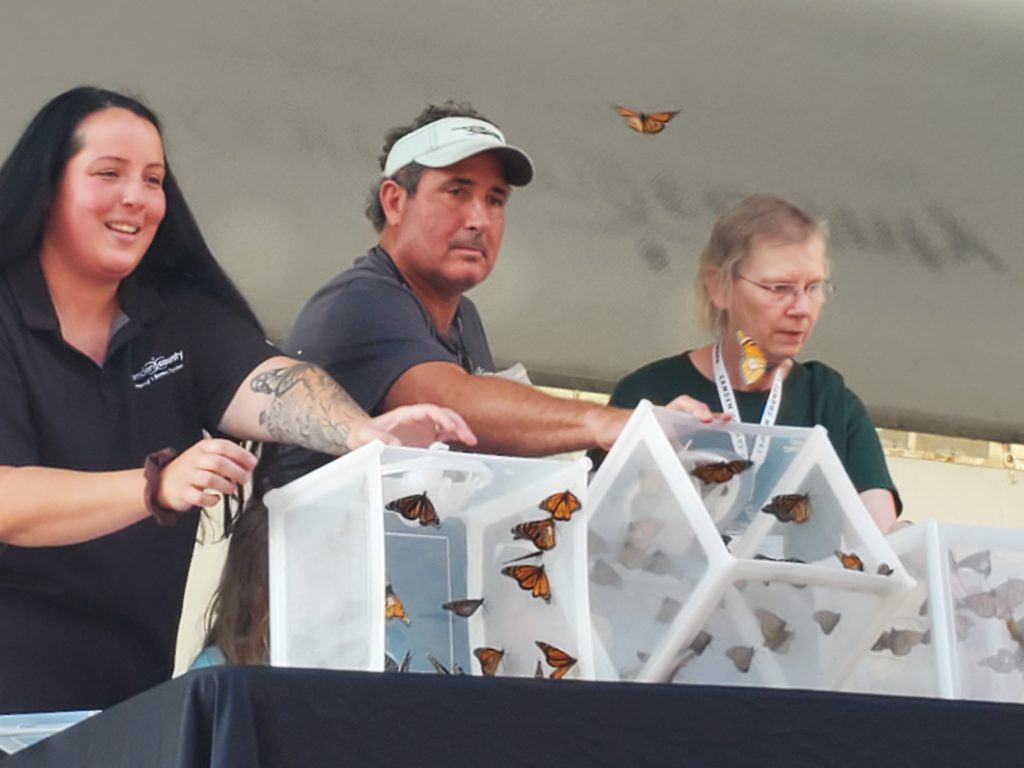

Available at the release of 100 Monarch butterflies on Aug. 27 in Cherry Hill were individual milkweed plants for families to take home. Pictured is one of the butterflies with a tag offering information on its origin.
Camden County and the Camden County Certified Gardeners released 100 butterflies on Aug. 27 as part of the annual Save the Monarch program held at the Department of Parks, Events and Community Outreach building in Cherry Hill.
The butterflies were marked with tags provided by the nonprofit Monarch Watch so people who find them will have information on their origins. The tags had no tracking devices.
“You just write down some information – like where you release it from, when, if it’s a male or female – and then we release them,” explained Lauren Bonus, superintendent of the Camden County Mosquito Commission. “And then wherever they end up, whether … all the way in Mexico or they stop somewhere else, somebody on the other end will have to find them and then take that data …”
“We’re saving the world because we need pollinators,” noted Camden County Commissioner Jeff Nash. “Pollinators are so important for our eco-system, and one of the great pollinators in our part of the world is the Monarch butterfly.”
Nash emphasized that the Monarch is a candidate for the endangered species list due to habitat loss, herbicides and the effects of climate change. As part of its migration route, the Monarch flies through Camden County and New Jersey, so area residents can contribute to saving it by planting milkweed varieties, since milkweed is the only plant that Monarch caterpillars will eat.
“The great thing about milkweed is once you plant (it), milkweed will come back year after year after year,” noted Karen Hickey, president of the Certified Garden Association.
At about 6:45 p.m. on the evening of the Monarch release, a hundred tagged butterflies raised in captivity began their journey to Mexico, where they will pass the winter season and lay their eggs.

A hundred adult Monarch butterflies were released to begin their journey to Mexico, where they will pass the winter season and eventually lay their eggs.
Bonus noted that it can take up to four generations for butterflies to complete the return from Mexico to Canada since the distance is so vast, and that way stations are important because they provide food for the butterflies traveling northward. The stations are where milkweed and other pollinator-friendly plants are planted.
To be considered a way station by Monarch Watch, a habitat must be at least 100 square feet, though the total area may be split among different sites in the location, for example, four 5-by-5-foot plots in one garden. In the past year, the county has created seven new certified stations.
At the release event, area residents were able to learn more about the county’s sustainability initiatives, take photos with the butterflies and bring home their own milkweed plant and seeds for native flowers to start a pollinator garden.
Staffers from the Camden County Office of Sustainability also shared their resources and recent initiatives, such as a new seed-saving and tool-lending libraries. The office intends to host a seed-saving program in October so guests can learn how to collect seeds from their gardens to plant the next year.
To learn more about the Monarch Watch’s way station program, visit https://www.monarchwatch.org. For more on county initiatives to benefit the Monarch or its life cycle, go to https://www.camdencounty.com/service/mosquito-commission/monarch-butterfly/.









